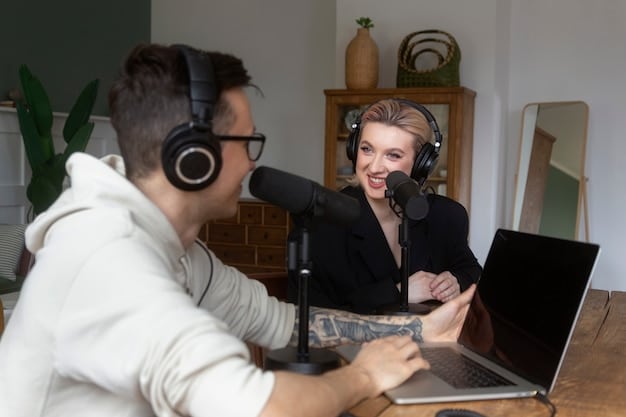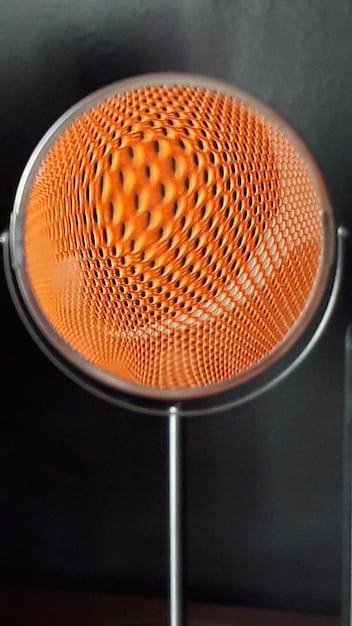Podcast Interview Fails: US Hosts’ Guide to Retain Listeners

Podcast interview mistakes can significantly impact listener retention; US hosts can avoid these pitfalls by preparing thoroughly, actively listening, engaging with guests, managing time effectively, and ensuring high audio quality.
Podcast interviews are a fantastic way to grow your audience, but common mistakes can drive listeners away. For US hosts, understanding and avoiding the top 5 podcast interview mistakes that cost you listeners is crucial for success.
Stop the Drop: Common Podcast Interview Mistakes and How to Fix Them
A captivating podcast interview can elevate your show, drawing in new listeners and deepening engagement with your existing audience. However, a poorly executed interview can have the opposite effect, leading to lost listeners and a damaged reputation. For podcast hosts in the US, understanding the common pitfalls is the first step toward creating compelling content that keeps audiences coming back for more.
Let’s dive into the top podcast interview mistakes and provide actionable strategies to avoid them.
Lack of Preparation: Failing to Research Your Guest
One of the most damaging mistakes a podcast host can make is failing to adequately research their guest. Listeners can easily detect when a host is unfamiliar with the guest’s work, background, or expertise, making the interview feel shallow and unprofessional.
- Do your homework: Thoroughly research your guest’s background, including their website, social media profiles, books, articles, and previous interviews.
- Identify key topics: Determine the key topics and areas of expertise your guest can speak to, and tailor your questions accordingly.
- Prepare insightful questions: Craft questions that go beyond surface-level inquiries and delve into the guest’s unique insights and perspectives.
By adequately preparing, you demonstrate respect for your guest, provide a more engaging experience for your listeners, and increase the likelihood of a successful interview.
In conclusion, preparation is key. Knowing your guest beforehand will ensure you ask compelling questions and engage in meaningful conversation.

The Listening Gap: Not Engaging Actively
A podcast interview should be a conversation, not just a series of questions and answers. Active listening is crucial for creating a dynamic and engaging interview that captivates listeners. Hosts who fail to listen actively miss opportunities to delve deeper into interesting points, ask follow-up questions, and create a natural flow to the conversation.
Here’s how to close the listening gap:
- Pay attention: Focus intently on what your guest is saying, both verbally and nonverbally.
- Resist interrupting: Allow your guest to fully express their thoughts before jumping in with a question or comment.
- Ask follow-up questions: Demonstrate that you are actively listening by asking follow-up questions that build upon the guest’s previous statements.
Active listening helps you to build rapport with your guest, uncover unexpected insights, and create a more compelling listening experience for your audience.
By actively listening, you demonstrate a genuine interest in your guest’s perspective, making the interview more engaging and rewarding for everyone involved.
Missed Connections: Failing to Engage Your Guest
A dry, impersonal interview can quickly lose listeners. Engaging with your guest and creating a genuine connection is essential for building rapport and fostering a compelling conversation. Hosts who fail to engage actively often come across as distant, uninterested, or even dismissive, which can alienate both the guest and the audience.
Here’s how to foster engagement:
Show Enthusiasm
Express genuine interest in your guest’s work and perspectives. Let your enthusiasm shine through in your tone of voice and body language.
Find Common Ground
Identify areas of shared interest or experience to create a sense of connection with your guest.
Use Humor Appropriately
Injecting humor into the conversation can lighten the mood and make the interview more enjoyable for everyone involved. However, be mindful of your guest’s personality and the overall tone of the show.
By engaging actively with your guest, you create a more dynamic and authentic conversation that listeners will find compelling and enjoyable.
Engaging with your guest creates a better listening experience and encourages the guest to share more valuable insights.
Time Troubles: Poor Management of Interview Length
Failing to manage the interview length effectively can lead to a number of problems, including rushed conversations, unanswered questions, and listener fatigue. US podcast hosts need to be mindful of their audience’s time and attention spans, and structure their interviews accordingly.
Here’s how to manage interview length effectively:
- Establish a time limit: Set a clear time limit for the interview in advance, and communicate this to your guest.
- Create a structured outline: Develop a detailed outline of the topics you want to cover, allocating specific time slots to each section.
- Monitor the time: Keep a close eye on the clock throughout the interview, and gently steer the conversation back on track if it starts to run over.
Effective time management ensures that you cover all the key topics in a concise and engaging manner, without overwhelming your listeners.
Time management respects your guest’s and listeners’ time, ensuring a focused and valuable interview.

Audio Awfulness: Neglecting Sound Quality
Poor audio quality can be a major turnoff for listeners. No matter how insightful or entertaining your interview is, if the sound is muffled, distorted, or plagued by background noise, listeners are likely to tune out. US podcast hosts should invest in good quality equipment and take steps to ensure clear, crisp audio.
Avoid audio issues with these tips:
Invest in Quality Equipment
Use a high-quality microphone, headphones, and recording software.
Record in a Quiet Environment
Minimize background noise by recording in a quiet room with sound-absorbing materials.
Test Your Audio
Before starting the interview, conduct a test recording to ensure that the audio is clear and free of distortion.
Investing in good audio equipment and maintaining a quiet recording environment are essential steps to ensuring a positive listening experience for your audience.
Listeners appreciate clear audio. Quality sound is paramount, so good equipment and a quiet spot are crucial.
Ignoring Marketing and Promotion
Creating a great podcast interview is only half the battle. To maximize its impact, you need to promote it effectively to your target audience. US podcast hosts often neglect the crucial steps of marketing and promotion, resulting in missed opportunities for audience growth and engagement.
Here’s how to champion effective promotion:
- Share on Social Media: Share snippets of the interview on social media platforms, tagging your guest and using relevant hashtags.
- Email Marketing: Send an email to your subscribers announcing the new episode, highlighting key takeaways and inviting them to listen.
- Cross-Promotion: Collaborate with other podcasters to promote each other’s shows, reaching new audiences and expanding your reach.
Strategic marketing and promotion can help you reach a wider audience, attract new listeners, and solidify your position as a leading voice in your niche.
Promotion is how you tell the world about your great interview, driving listens and growing your audience.
| Key Point | Brief Description |
|---|---|
| 📚 Prep Properly | Research guests, prep insightful questions. |
| 👂 Listen Actively | Engage fully, ask follow-ups, build rapport. |
| ⏱️ Time Consciously | Respect time, keep conversation structured. |
| 📢 Promote Widely | Share episodes, tag guests, cross-promote. |
Frequently Asked Questions
▼
Thorough research demonstrates respect for the guest and allows you to ask informed and engaging questions, creating a more valuable experience for your listeners.
▼
Focus intently on what the guest is saying, resist interrupting, and ask follow-up questions that demonstrate your engagement with their responses.
▼
The ideal length depends on your audience and the content of the interview, but aim for a concise and engaging format that respects your listeners’ time, typically 30-60 minutes.
▼
Common audio issues include background noise, muffled sound, distortion, and inconsistent volume levels, all of which can detract from the listening experience.
▼
Promotion is crucial for reaching a wider audience, attracting new listeners, and maximizing the impact of your podcast interviews. Use social media, email marketing, and cross-promotion strategies.
Conclusion
By avoiding these top 5 podcast interview mistakes, US hosts can significantly improve the quality of their shows, enhance listener engagement, and build a loyal and growing audience. Remember, preparation, active listening, engagement, time management, and audio quality are critical to podcasting success.





